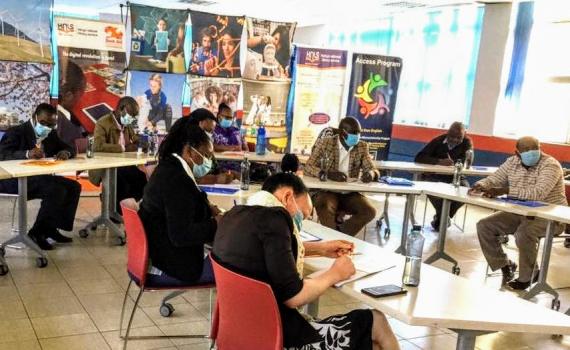
Kenyan schools closed abruptly in March 2020, disrupting education for over 17 million children. Government guidance was to move teaching online, and before COVID-19 struck, the government had made efforts to equip schools with computers and to support the use of digital technology in education.
However, the majority of teachers in public (state-run) schools had not yet integrated computers into their classes. Most teachers lacked digital skills and did not know how to use online teaching and learning tools. Children also lacked technology skills, and poorer families did not have the resources needed to support virtual learning - computers, tablets, smartphones or internet connections.
It was this situation that Nakuru Public Library in Kenya’s Rift Valley region sought to address, in partnership with nearby Kabarak University. Their idea was to raise teachers’ awareness about free online tools that could be used for teaching and learning, and to train them to use these tools.
BUILDING TEACHERS’ CONFIDENCE TO TEACH ONLINE
“By training teachers and school librarians to use tools like Zoom, Microsoft Teams, Google Classroom and Moodle, we aimed to build their confidence to create virtual classrooms and teach online,” said Purity Kavuri Mutuku, head of Nakuru Public Library. The training also included other important knowledge and skills, like how to access and share e-resources and how to be safe online, which the teachers could use and pass on to their students.
The partners launched their initiative in April 2020. They drew on diverse sources of support: Kenya National Library Services (KNLS) headquarters in Nairobi and Kabarak University both subscribed to Zoom video conferencing licences, which supported the training of teachers. The internet service provider, Safaricom, developed a free data package for students to access virtual classes, online revision materials and e-resources. Encyclopedia Britannica Online and some Kenyan publishers, like Longhorn, provided free access to online content for learners, including educational videos, revision materials and story books.
The lockdown ended in January 2021. By then, the library’s training had reached 30 teachers at 10 schools. And the teachers were teaching their pupils.
“I am now able to transmit knowledge to students from my school and fellow teachers. My students can confidently access e-resources, do and submit assignments online. I hope Nakuru Public Library will continue empowering more teachers with digital literacy skills to enable them to operate in a virtual environment/classroom confidently.” - Doreen Nyamosi teacher at Nakuru Central Secondary.
HELPING CHILDREN WITH THEIR EXAMS
After lockdown, concerned about possible further COVID-19 school closures, the Nakuru Public Library and Kabarak University continued to provide ICT training for teachers. The library also opened its computer lab to children from poorer families to submit assignments and prepare for exams.
“We were especially supporting teachers and children in the run-up to two very important exams scheduled for March / April 2021 - the Kenya Certificate of Primary Education (KCPE), which marks the completion of primary school, and the Kenya Certificate of Secondary Education (KCSE), that children take when they leave secondary school. As a result of our training, 45 teachers, 15 librarians and 30 school administrators were able to make contact with and provide virtual learning to 750 children who sat for the two exams,” said Purity.
The initiative has made an impact that will last long into the future.
“We have increased digital literacy among the teachers, school librarians, administrators and learners. At schools, the laptop computers received from the government are no longer just sitting in cabinets - they are in the hands of learners. There is greater use of e-resources. The children are using online tools like Moodle to find e-resources and study on their own, even when schools are in session, and also to submit assignments. And parents are now more aware of the importance of digital devices in supporting education, and are more willing to share their smartphones or tablets, and to pay for internet data for their children,” said Purity.
PLIP-EDUCATION





